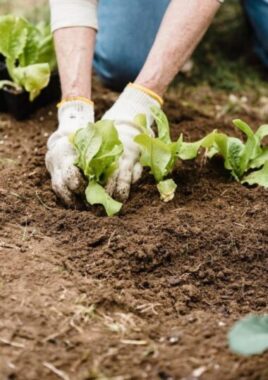Companion Planting Demystified: Boost Your Garden’s Harmony 🌿🌼
Enhanced Growth: Unlocking the Potential of Companion Planting 🌱🚀
In the realm of companion planting, enhanced growth stands as a testament to the power of strategic plant partnerships. By understanding the dynamics between plants and harnessing their synergies, gardeners can unlock a realm of possibilities for flourishing gardens.
Optimizing Nutrient Absorption:
Companion planting isn’t merely about placing plants side by side; it’s about creating a community where each member contributes to the overall well-being. Certain plants, when paired strategically, enhance each other’s nutrient absorption. For instance, nitrogen-fixing plants can benefit neighboring plants by enriching the soil with this essential nutrient, promoting robust growth.
Maximizing Yield:
Pairing plants with complementary growth habits can optimize space and resources. Tall plants providing shade can protect more delicate, sun-sensitive companions. This synergy ensures that each plant receives the light it needs, fostering healthy growth and maximizing overall yield.
Improving Soil Health:
Some plants possess unique qualities that enhance soil health. Legumes, for example, have nitrogen-fixing abilities, enriching the soil with this vital nutrient. Integrating them into your garden as companions can lead to healthier soil, providing a fertile foundation for plants to thrive.
Biodiversity Boost: Nurturing a Resilient Garden Ecosystem 🌿🌼
Companion planting goes beyond enhancing individual plant growth; it fosters biodiversity, creating a garden ecosystem that is robust and adaptable.
Diverse Plant Pairings:
Pairing a variety of plants with different growth habits and attributes promotes biodiversity. This diversity isn’t just aesthetically pleasing; it also helps prevent the rapid spread of pests and diseases. A mix of tall and short plants, flowering and non-flowering, creates a balanced and visually appealing garden tapestry.
Natural Pest Control:
Certain companion plants act as natural deterrents to pests. For example, planting aromatic herbs like basil and rosemary near susceptible plants can repel unwanted insects. This natural pest control minimizes the need for chemical interventions, contributing to a healthier and more sustainable garden.
Resilience to Environmental Changes:
A biodiverse garden is better equipped to withstand environmental challenges. Different plants have varying tolerance levels to pests, diseases, and weather conditions. This diversity ensures that even if one type of plant faces challenges, others can thrive, maintaining the overall health of the garden.
Eco-Friendly Gardening: Nurturing Nature’s Balance 🌿🌍
Companion planting aligns seamlessly with the principles of eco-friendly gardening, offering a natural and sustainable approach to cultivating your green space.
Reducing Chemical Dependency:
By harnessing the natural attributes of companion plants, gardeners can reduce their reliance on synthetic pesticides. For instance, planting marigolds alongside vegetables can deter nematodes, eliminating the need for chemical nematicides.
Sustainable Soil Management:
Companion planting contributes to sustainable soil management practices. Nitrogen-fixing plants, like legumes, improve soil fertility naturally, reducing the need for synthetic fertilizers. This sustainable approach ensures the long-term health of both your garden and the broader environment.
Promoting Balanced Ecosystems:
Creating a garden that mimics natural ecosystems encourages the development of balanced, self-sustaining systems. By fostering beneficial relationships between plants, insects, and soil microorganisms, companion planting contributes to the overall health and resilience of the ecosystem.
In embracing enhanced growth, biodiversity boost, and eco-friendly gardening through companion planting, gardeners not only cultivate beautiful and productive spaces but also become stewards of a balanced and sustainable natural environment. This holistic approach to gardening invites individuals to connect with nature, fostering a deeper appreciation for the intricate web of life in their own backyards.
Creating a biodiverse and eco-friendly garden involves strategic pairing of plants that complement each other’s growth habits, deter pests, and enhance overall sustainability. Here are some ideal plant pairs to discover for a thriving and harmonious garden ecosystem:
1. Tomatoes and Basil:
Benefits:
- Pest Deterrence: Basil repels certain pests that commonly affect tomatoes, such as aphids and mosquitoes.
- Improved Flavor: Companion planting with basil is believed to enhance the flavor of tomatoes.
2. Beans and Corn:
Benefits:
- Nitrogen Fixation: Beans are nitrogen-fixing plants, enhancing the soil’s nitrogen content, which benefits the nitrogen-hungry corn.
- Vertical Space Utilization: Corn provides a natural trellis for beans to climb, optimizing space.
3. Carrots and Onions:
Benefits:
- Pest Control: Onions deter carrot flies, reducing the likelihood of carrot crop damage.
- Space Optimization: Carrots grow underground, while onions grow above, making efficient use of space.
4. Cucumbers and Nasturtiums:
Benefits:
- Pest Repellent: Nasturtiums act as a natural deterrent for cucumber beetles, protecting cucumber plants.
- Edible Flowers: Nasturtium flowers are edible and add a peppery flavor to salads.
5. Roses and Garlic:
Benefits:
- Pest Deterrence: Garlic deters common rose pests like aphids and provides natural protection.
- Soil Health: Garlic has antibacterial and antifungal properties, contributing to overall soil health.
6. Marigolds and Vegetables:
Benefits:
- Nematode Control: Marigolds release compounds that deter nematodes harmful to many vegetables.
- Color and Beauty: Marigolds add vibrant colors to the garden, enhancing its visual appeal.
7. Apple Trees and Chives:
Benefits:
- Pest Control: Chives planted around apple trees deter pests and enhance overall orchard health.
- Companion Aesthetics: Chives’ slender stalks complement the stature of apple trees.
8. Brassicas and Aromatic Herbs:
Benefits:
- Pest Repellent: Aromatic herbs like rosemary and thyme planted alongside brassicas deter cabbage worms and aphids.
- Flavor Enhancement: Herbs can enhance the flavor of certain brassica crops.
9. Strawberries and Borage:
Benefits:
- Pollinator Attraction: Borage attracts pollinators, enhancing strawberry pollination and fruit production.
- Soil Enrichment: Borage’s deep roots bring up nutrients from the soil, benefiting strawberries.
10. Squash and Radishes:
Benefits:
- Pest Control: Radishes deter squash borers, protecting squash plants.
- Space Utilization: Radishes mature quickly, providing an early harvest before squash plants spread.
Discovering these ideal plant pairs and incorporating them into your garden fosters a balanced and eco-friendly environment. Experimenting with companion planting not only contributes to the health of individual plants but also promotes the sustainability of the entire garden ecosystem.



